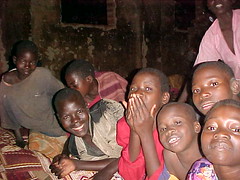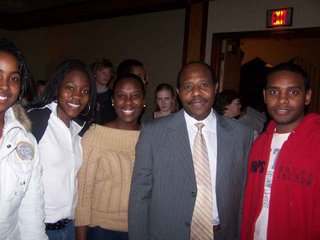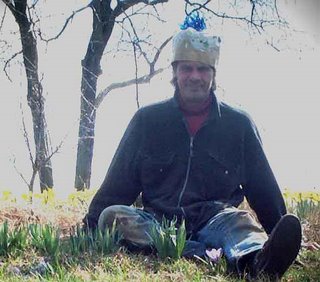Earth Day, Hooray!I haven't made a blog post in a while. I feel rather safe in not positng figuring that nobody will notice anyway. So I was pleased to open my email and see one from
Potash noting my lack of posts and asking, "Are you okay?" It's nice to know my absence has been noted.
It really is better for me to get into a rythmn of regular posting, at least that way I have more focused ideas for posts. A long time with no posts has me grappling with 101 and one things I've thought to write about; even in the best of circumstances as some have noticed editing isn't my forte.
The winners of the 2006
Kaybees, The Kenyan Blog Awards have been announced. Congratulations to all the winners.
I need to update my blogroll include the winners and nominees. It scares me a little even to open the Blogger Dashboard to post and I really pause when it come to tinkering with the template. So it's a good idea to click on the Kaybee's link above to discover some really great blogs. Don't neglect the links to the nominees either.
Keguro always makes me think and in congratulating the Kaybee winners expresses a sentiment posed as a question:
[W]hat relationship does African and, more specifically, Kenyan blogging have with Euro-American blogging?
Keguro links to this post at
blac (k) academic where
nubian asks soul searching questions about why she blogs. I recommend reading the comments. One reason for reading the comments is to be reminded that this medium of blogs isn't one-way communication. blac (k) academic gets ten times the traffic as I do and lots of comments too.
People the world over have so much to say. A while back during a contintious conversation in a forum which Keguro participated. I wrote Keguro an email in re the debate and he kindly responded, telling me "I come from a contentious culture" and that disagreement isn't disrespect rather in fact the opposite.
Those of you who have been with me for a while know that when I first started out I used a photo of myself wearing an Afro wig in my profile. Imagining that it's easy to see I come to Keguro's question about relationships in the blogosphere ass-backwards--a backwards ass?
The relationship of African blogging with Euro-American blogging in many instances may not be well-developed,and sometimes contentious. Nevertheless blogging is a many-to-many medium, so the the relationship isn't a static affair. My hope is that Americans in particular, because it seems to me we are particularly insular, engage in the conversations with people around the world.
Today is Earth Day. I located a nice photograph of our lovely blue planet Earth for the occasion. In the process I opened Flickr and saw the photo from
Life in Africa's photostream. As my eyes glanced over the photo, the three girls in the righthand corner of the picture captured my attention. And when I gazed at the third girl my eyes welled with tears. They have smiles on their faces but tears come to my face.
I do feel very sorry about the circumstances that create such hardship for these children and so many more. When I worked as a waiter there was a Brazilian studying for a test on American history for qualification for US citizenship. He was recalling facts about the American Civil War. He voiced cracked discussing it saying, "Oh the humanity!" Look at those children in the photograph, their faces are the faces of children everywhere. Who cannot feel more alive in the presence of children? We are reminded of the people they are and can become, and so we're reminded who people we really are as well. Oh, the humanity!
Last week PBS Nova showed a film
Dimming the Sun:
New evidence that air pollution has masked the full impact of global warming suggests the world may soon face a heightened climate crisis.
It's a sobering film which I recommend watching for when it's shown again. The Web pages are worth a look as well. In particular the
Producer's Story. Filmmaker David Sington remarks how these Nova films are frequently joint ventures between a U.S. and U.K. broadcasters, so it's common that two slightly different films are made for the respective audiences. But in this case the British public is far more convinced about the reality of global climate change than is the American public, so accounting for the American skepticism presented a challenge. Sington makes this observation about American views:
It is my observation that on the whole people tend to believe what is convenient to them. Faced with a choice between an awkward fact and a comforting fiction, most people will take the fiction any day. And global warming is certainly inconvenient. Just when we have finally freed ourselves from the tedium of tilling the earth and gotten nice and comfortable with a big TV, central heating, cheap flights to exotic destinations, and an armor-plated all-terrain vehicle for nipping down to the mall, along come some bloody scientists to tell us that we can't go on as we are and as we like doing.
What blunderheads! Opps, that includes me, and I know it. Global warming is not a national issue rather a global issue. Thinking in terms of narrow national interest in this regard is confounds meaningful action.
Faced with a reality of such consquence as global climate change, imagining winners and loosers is folly. Humanity is on the same spaceship Earth. What we do affects all the rest of us. The quality of relationships between people all over has never before been as important as now.
Recently out-grrl did a diary at
The Daily Kos about
visiting Haiti. She wrote:
I still believe - I have always believed that if everyone would do one small thing, we could make a huge impact in the world. Seeing people in that situation made me realize that perhaps we need to do a bit more than a little. A lot of neglect made that place and it is going to take a lot of work to make it even human.
She's right about the magnitude of the challenge, and her perscription seems right: we all need to do. It seems people are most motivated when we have real connections with others. Blogs give voice to people all over and people all over can hear and create dialogs.
Nicholas Kristof won the Pulitzer for Commentary this year. Seeing him interviewed it's been interesting to hear his views on advocacy, even claiming he's not a very
opinionated person. But Darfur is something where opinions matter to him; surely people would care if they knew. He tells a story:
The image that has remained with me from that trip is the scene of refugees camped along the border, seeking shelter under trees. Under the first tree I approached were two orphans whose parents had been killed—a cute little girl about four years old sitting with her baby brother in her arms. Under the second tree were two brothers. Both had been shot, but the one with less severe injuries carried his sibling on his back for 49 days in search of safety. Under the third tree was a widow whose husband and parents had been shot and her parents’ bodies thrown into the village well to poison it. Under the fourth tree was a woman whose husband and children were killed in front of her, she and her sister were raped, and her sister killed; this woman survived but was mutilated. These were just the first four of many trees, and underneath all of them were more refugees with horrific stories.
The New Orleans Times-Picayune also won a Pulitzer. I saw one photographer with the paper interviewed on TV--sorry I don't have the link or his name--who told about venturing out on a boat with his camera. He saw a man walking shirtless on a bridge above him and pointed the camera to take the shot. The man threw is hands up as if to ask: "You're going to take my picture and do nothing to help me?" The reporter resolved that he would not report if he couldn't help people too.
From this post at
Yebo Gogo I learned that Fontaine is a reporter. His post wrestles with the propriety of reporters helping those caught up in the events they are reporting. It's not such an easy issue. Part of the reticence Kristof felt about writing opinion pieces are exactly the ethical issues reporters negotiate that Fontaine's post raises. What makes matters so complex is there are issues which demand a response; for example under each tree as Kristof tells us.
Filmmaker Sington observes that caught between an "awkward fact and a comforting fiction" we'll choose the fiction any day. In this inter-connected world the accumulation of facts can make us seek out fictions to hold our worldviews together. What are the journalistic ethics of purveying such comfortable fictions, for example George Will on
global warming? The world obviously needs reporters who give us the facts. The reporter moved to action by facts seems less a danger than journalists moved to create fictions in the face of facts.
We depend on our Earth as a child depends on her mother. To care about one another seems the only way to care for the Earth. The photograph of those Ugandan girls, night commuters, seemed a good picture to celebrate Earth Day. Let us act for the children today and for tomorrow's children too. We are, as the Abrahamic traditions teach, made of earth oursleves.




